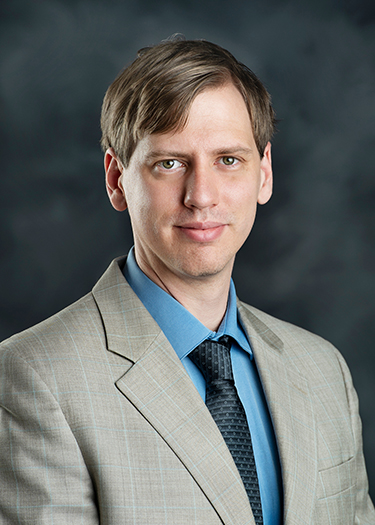CAVS Researcher Receives CAREER Grant for Atomic Modeling Research
September 23, 2022
Doyl E. Dickel
Photo by Megan Bean
Photo by Megan Bean
Doyl E. "Ted" Dickel, assistant professor in the Department of Mechanical Engineering, is receiving the NSF's Faculty Early Career Development (CAREER) award, which will provide a $682,571 grant to support his research. Dickel is developing machine learning models that can incorporate the magnetic properties of iron and cobalt when modeling potential materials for use in items such as electric motors and steel.
"The traditional way of improving steel was to cast a bunch of different types of steel under different conditions and see which one performs the best," Dickel said. "That works, but it is really slow and expensive. If you have a good model, you can predict how different elements will impact steel properties much faster and at much less cost. Because iron is magnetic, it has been difficult to develop a predictive model at the atomic level. Magnetism adds extra complexity into how your material performs and behaves.
"If we can get iron and all its magnetic properties correct in the models, we can improve the steel we make and improve the way we make magnets, which would impact things like electric vehicle motors and other technologies. If we can improve the iron-based materials used, it would decrease reliance on imported rare earth minerals."
Dickel joined the mechanical engineering faculty in 2020. Previously, he worked as a postdoctoral associate and assistant research professor at MSU's Center for Advanced Vehicular Systems. He earned a bachelor's degree in physics from the California Institute of Technology and a doctorate in physics from Clemson University.
Dickel said the resources available at CAVS and MSU's High Performance Computing Collaboratory, which is home to one of the most powerful supercomputers in U.S. academia, have helped advance his materials research.
"The high performance computing facilities are amazing for the work we need to do," Dickel said. "I've also had great support from [CAVS Executive Director] Clay Walden and [Mechanical Engineering Department Head] Haitham El Kadiri, who has placed a priority on mentoring junior faculty and helping with proposal writing. As we've been working on these topics in recent years, we've had a great infrastructure and support from administration."
For more on MSU's Bagley College of Engineering, visit www.bagley.msstate.edu.
By James Carskadon
